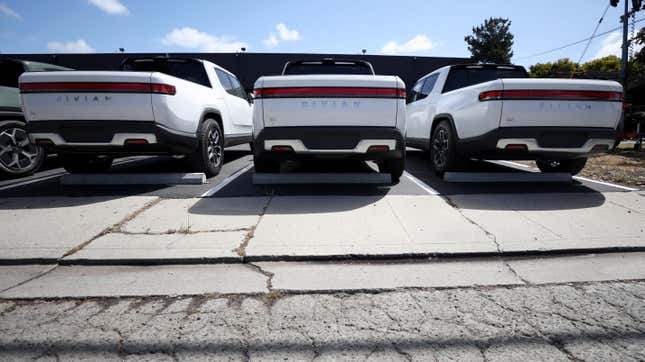
Nasdaq is dropping Rivian because it shrunk too much.
The electric carmaker will lose its spot on the Nasdaq-100, which comprises 100 of the largest non-financial companies listed on the Nasdaq stock exchange, on June 20, Nasdaq confirmed yesterday (June 13).
The EV stock is being booted because it has had a weight of less than 0.1% for two consecutive months on the market-capitalization-weighted index, where companies with growing stock prices yield higher influence. The biggest companies on the New York-based index Microsoft and Apple, both of which have a roughly 12% weightage.
JPMorgan Chase analyst Min Moon, who had warned that Rivian was on the verge of getting kicked off two weeks ago, also correctly predicted its replacement: ON Semiconductor (Onsemi).
Nasdaq will sell all the shares it holds in Rivian and replace them with On Semiconductor’s shares. This could deal another blow to the struggling, money-draining EV company.
Charted: Rivian’s steep downhill drive
Company of interest: ON Semiconductors
The Nasdaq addition isn’t the Scotsdale, Arizona-based company’s first big milestone this year. In May 2022, On Semiconductor was recognized as a Fortune 500 company, ranking among the largest US corporations by total revenue for the year. The following month, it was added to the S&P 500.
“Our addition to the prestigious Nasdaq-100 Index is a testament to the successful execution of our strategy over the last two years, during which our employees around the world have unlocked tremendous value for Onsemi shareholders through their unwavering dedication and innovation,” Hassane El-Khoury, president and CEO of Onsemi, said in a June 12 statement.
Rivian and ON Semiconductor, by the digits
20%: How much Rivian stock has fallen so far this year amid stiff competition, supply-chain hiccups, and challenges with scaling up
90%: How much Rivian’s share price has fallen from its record high in November 2021.
9,395: Vehicles Rivian built in three months ended March 31, 2023. It needs to pick up the pace to meet the goal of producing 50,000 EVs this year.
$14.3 billion: Rivian’s market cap
$15.25: Rivian’s stock price as of June 13
$92.67: ON Semiconductor’s stock price
$40 billion: ON Semiconductor’s valuation as of June 13, up almost 46% over the last year. It’s tripled from three years ago, the company claims
$8.3 billion: ON Semiconductor’s record-breaking revenue in 2022, up from $6.7 billion in 2021, as per its regulatory filings
2: Consecutive years of revenue growth posted by Scotsdale, Arizona-based ON Semiconductor.
$2 billion: The investment ON Semiconductor is considering making to boosting production of silicon carbide chips that are widely used to help extend the range of electric vehicles, it said in May.
Quotable: Analysts are still bullish on Rivian
“Our clear takeaway is that [Rivian] has moved past the many challenges / fire fights which deeply challenged operations in 2022. With better stability, [Rivian] now has the bandwidth to properly address manufacturing process improvements / material cost reduction initiatives—there is much low hanging fruit, much runway, and clear improvements are being made. And with clear line of sight on [Rivian’s] initiatives, we see improved confidence on the path to reaching gross margin breakeven in 2024.”—Barclays analyst Dan Levy, who reaffirmed an “outperform” rating and a $22 price target, wrote in a note earlier this month.
Related stories
💥 One casualty of the Fed’s rate tightening cycle: EV startups
🤑 Why Rivian tried to charge customers an extra $20,000 for pre-orders
🙅 Why BMW, Nissan, Rivian, Hyundai, Volvo and Volkswagen no longer qualify for Biden’s EV tax credits